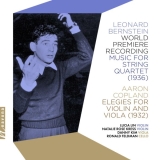Eine Weltersteinspielung und ein selten zu hörendes Werk sind auf diesem Album gepaart. Mit 18 Jahren schrieb Leonard Bernstein 1936 zwei Sätze für Streichquartett, wobei der zweite Satz erst kürzlich in der U.S. Library of Congress entdeckt wurde. Die Elegies for Violin and Viola hat sein Mentor und guter Freund Aaron Copland etwas früher, 1932 verfasst.
Mit quicksilbriger Unruhe und viel Intensität, so wie Bernstein selber war, startet das Allegro Vivace und nicht nur, die ersten Takte sind tonal sehr frei gehalten. Während die Spannung bleibt, wird der harmonische Ton im Verlauf ein wenig dezenter. Das folgende Andante (Tempo di Sarabande) hat Bernstein im Vierertaktmaß geschrieben, so dass er von der Tanzform, die Sarabande steht im dreiteiligen Taktmaß, nur das langsame elegante Tempo übernommen hat. Damit bekommt die Musik eine eher getragen würdevolle Note und bietet damit einem Gegensatz zum quirligen ersten Satz.
Eine nicht nur langsame, sondern nachdenkliche bis traurige Note wird in den Elegien für Violine und Viola von Aaron Copland hörbar.
Die in den USA ansässigen Instrumentalisten gestalten mit technischer Finesse sowohl den schnellen ersten Satz des Quartetts wie sie im zweiten und den Elegien der Ausdruckskraft den Raum bieten, die Gefühlswelten zur Geltung kommen zu lassen, ohne deswegen zu überzeichnen. So bietet diese Ersteinspielung des Quartetts die schöne Gelegenheit, das schmale kammermusikalische Schaffen von Bernstein um ein Jugendwerk erweitert zu sehen.
A world premiere recording and a rarely heard work are paired on this recording. At the age of 18, Leonard Bernstein wrote two movements for string quartet in 1936, the second of which was only recently discovered in the U.S. Library of Congress. The Elegies for Violin and Viola was written a little earlier, in 1932, by his mentor and good friend Aaron Copland.
With quicksilver restlessness and much intensity, as Bernstein himself was, the Allegro Vivace starts and not only, the first bars are tonally very free. While the tension remains, the harmonic tone becomes a little more subdued as it progresses. Bernstein wrote the following Andante (Tempo di Sarabande) in four-bar time, so that he only adopted the slow elegant tempo from the dance form, the Sarabande is in three-bar time. This gives the music a rather dignified note and offers a contrast to the lively first movement.
The Elegies for violin and viola by Aaron Copland are not only slow, but also reflective and even sad.
The instrumentalists, who live in the US, shape the fast first movement of the quartet with technical finesse, and in the second and the elegies they offer the expressive power the space to show the emotional worlds to their best advantage without overdrawing them. This first recording of the quartet thus offers a wonderful opportunity to see Bernstein’s narrow chamber music oeuvre expanded to include a youthful work.
























